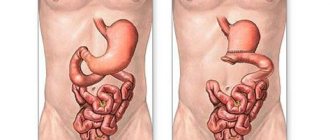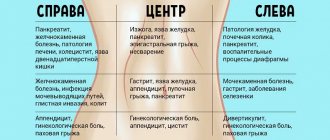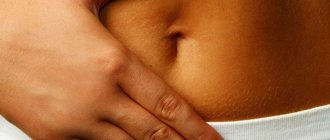The lower abdomen pulsates in women with gynecological diseases (inflammation of the appendages, suppuration of the ovary, rupture, cyst), and in men the cause may be the movement of a stone along the ureter, an inguinal hernia. Pain and throbbing in the umbilical region with a shift to the right and down is typical for appendicitis.
The feeling of a pulse beating in the abdomen in time with the contractions of the heart in men over 60 years of age, smokers and with high blood pressure requires urgent consultation with a doctor. This is important to rule out a very life-threatening abdominal aortic aneurysm. Diagnostics includes ultrasound, tomography, general tomography of the abdominal cavity. For aneurysm and tumor, suppuration, surgery is required; for other diseases, medications are most often used.
The stomach is pulsating: what does a person feel?
When complaining that the abdomen is throbbing, the patient can describe his sensations inside the abdominal cavity in the following words:
- stomach twitches;
- I feel a palpitation, a heartbeat near the navel;
- you can see how much your stomach is pulsating;
- there is a pulsation in the stomach;
- ticks, stomach pulsates in time with the heart;
- like a ball bouncing.
If such symptoms are present, the doctor asks clarifying questions about the time of onset, connection with food, physical activity, and whether the pulsation in the abdomen is constant or periodically appears and disappears. Then the patient reports on previous illnesses (history), after which an examination is carried out.
If the disease is serious, then patients usually describe the symptoms briefly; with functional and mental disorders (changes in the perception of sensations), the complaints are very numerous and completely varied, colorful.
Pulsations in the stomach are a harmless symptom or sign of stomach diseases
The range of diseases in which this symptom can manifest itself is very wide. Moreover, with varying degrees of probability, this could actually be a pulsation of the stomach or a third-party disease that only radiates to the stomach area.
In people of asthenic type (thin and tall), pulsation in the stomach area is a normal variant due to the close location of the aorta and stomach. Pulsations can cause acute or chronic gastritis in the acute stage. Sometimes established stomach tumors can pulsate, which is one of several diagnostic criteria for stomach cancer.
However, most often the pulsation felt in the stomach area is associated with vascular changes. If the aorta is narrowed (for example, with atherosclerosis), then the pressure inside the vessel will increase, and turbulent blood flow with a characteristic pulsation will occur. If the aorta is dilated, then its vascular wall is no longer able to maintain even normal pressure of blood flow, it becomes less and less elastic.
Why did the pulsation appear in the lower abdomen?
Pulsation in the lower abdomen can be associated with inflammatory diseases; in women, the cause is most often gynecological diseases:
- adnexitis (inflammation of the appendages), tubo-ovarian abscess (suppuration in the fallopian tube and ovarian tissue);
- ovarian cyst and its complicated course (pedicle torsion);
- adhesive disease of the abdominal cavity after cesarean section, removal of fibroids or other pelvic surgery;
- uterine prolapse;
- endometriosis;
- tumor processes in the uterus, appendages;
- ectopic pregnancy;
- rupture of the ovary (apoplexy), fallopian tube.
In men, the lower abdomen twitches and pulsates when a stone moves through the ureter, appendicitis, or inguinal hernia. When the abdomen pulsates in the lower part of a girl who is sexually active, it is necessary to conduct a pregnancy test. During pregnancy, pulsation is not dangerous, if there is no pain or bleeding; if they are detected, an urgent examination by a gynecologist is required, since such symptoms are typical for a miscarriage.
Non-hazardous causes of pulsation
You can hear your stomach pulsating after a long stay in one position or intense exercise. This is a natural physiological process that should not cause concern.
Often, beating is caused by stressful situations, which is associated with the tenth pair of cranial nerves, which intertwine the stomach. More often than others, patients with VSD are susceptible to this symptom, which further worsens their condition.
You can feel your stomach pulsating after overeating. Excess food simply stretches the walls of the stomach. The nerves located inside the sheath begin to receive return impulses from the vagus nerve. Motility increases and some pulsation can be observed in the navel area.
If stomach pulsation appears for the first or second time, do not worry. The symptom was caused by emotional overstrain. If this is the case, then taking a sedative will be enough. You can lie on your side and relax - this will relieve tension in your stomach.
Frequent beating in the abdomen is observed in tall people due to the close location of the digestive organs to the aorta. Strong pulsation can bother patients with gastritis during an exacerbation.
If the symptom recurs repeatedly and causes severe discomfort, it is necessary to visit a gastroenterologist or therapist to determine the cause of fluttering in the stomach.
There are many types of parasites, but the most common are roundworms and pinworms. They can multiply very quickly, causing indigestion and increased gas formation, which is why the patient feels the movement of gases through the intestines as a stirring.
Tapeworms can also cause a feeling of something foreign moving in the stomach:
- bovine tapeworm;
- wide tape;
- pork tapeworm.
These worms live in the human intestines and provoke allergic reactions in the body and severe intoxication. In addition to the feeling of movement, these helminths cause anemia, disruptions in the gastrointestinal tract, and damage the intestinal walls.
If the problem is localized specifically in the stomach, then pulsation is a temporary symptom. Since the stomach is innervated by the tenth pair of cranial nerves (vagus), the cause may be a neurological picture. Often patients suffering from vegetative-vascular dystonia (or neurocirculatory atony) complain of a similar symptom. This rather unpleasant sensation only worsens the neurological symptoms.
The stomach has a powerful muscular lining; overeating causes stretching of the wall. Nerve impulses coming from the nerves located inside the wall trigger a return impulse from the vagus nerve. It stimulates increased motor skills and the person may feel some pulsation.
With gastritis (especially with gastritis with high acidity), spasm of the pylorus occurs. In this case, the food bolus does not pass into the duodenum and lingers in the stomach. Natural motility of the gastrointestinal tract under conditions of pylorospasm causes sensations of pulsation.
Pulsation in the abdomen: causes of sensations in different places
It is not always possible to immediately suspect a disease based on the location of the pulsation in the abdomen, since in most patients the localization of sensations changes; it is more important to take into account the accompanying symptoms.
In the area of the stomach, navel
The area of the stomach is the epigastric angle (epigastric zone); if strong pulsation appears between it and the navel, it is necessary to exclude the most dangerous cause - an abdominal aortic aneurysm.
This is a protrusion of its wall, which is often accompanied only by pulsation. Abdominal pain is often absent or tolerable, but attacks similar to radiculitis and exacerbation of inflammation of the pancreas are also possible.
Men over 60 years of age are more often affected, 2/3 of them are smokers. When the diagnosis is made late, the aortic wall becomes thinner, which can lead to rupture during physical stress or even at rest. Severe internal bleeding occurs because the aorta has the highest blood pressure. Most die.
The cause of aneurysm in 90% of cases is atherosclerosis, less often it develops with:
- aortoarteritis,
- syphilis,
- tuberculosis,
- rheumatism,
- mycoplasma infection,
- salmonellosis,
- abdominal trauma.
There is also a risk with congenital weakness of the aortic wall. Provoking factors can be arterial hypertension and cough in chronic lung diseases.
To the right of the navel
Pulsation to the right of the navel is most often associated with intestinal diseases, where the small intestine and the ascending part of the large intestine (colon) are located. If the place where the pulse is felt is closer to the groin area, then this may be one of the first symptoms of appendicitis.
Suspicion of its development is confirmed by:
- pain in the epigastric and periumbilical region;
- movement of pain downwards, closer to the groin;
- pain increases with coughing and laughing, decreases when lying on your side with bent knees;
- nausea, vomiting;
- temperature rise to 37.2-37.5 degrees;
- rapid pulse;
- constipation or diarrhea.
Painless forms of appendicitis with abdominal throbbing or twitching sensations are typical in elderly patients with diabetes.
To the left of the navel
To the left of the navel and in the upper third, pulsation is a sign of inflammation of the pancreas (pancreatitis), intestines (colitis), flatulence, and dysbacteriosis.
Also in this area, a pulse can be felt in case of an abdominal aortic aneurysm or a tumor neoplasm (benign and malignant). Signs indicating an intestinal tumor may include:
- rumbling in the stomach;
- alternating diarrhea and constipation;
- the appearance of blood in the stool or a dark, tarry appearance;
- painful urge to have a bowel movement;
- general weakness;
- loss of weight and appetite.
Above the navel
Pulsation and pain above the navel are possible with exacerbation of duodenal ulcer. It is usually associated with eating (30-40 minutes after), hunger pain and night pain are also typical. An important feature of this area is that an atypical form of myocardial infarction can occur with a sensation of pulse beating and squeezing.
Patients usually report severe weakness, nausea, vomiting, and diarrhea. The skin is pale and covered in cold sweat. The difference between a heart attack and diseases of the digestive system is that eating does not affect your well-being in any way, and when moving it becomes worse; rest alleviates the condition.
In the intestines
If a patient complains of pulsation in the entire abdomen or describes a feeling of beating of a vessel against the background of lack of air, interruptions in heart function, or strong causeless fear, then this is typical of a panic attack.
Its distinctive features:
- general condition is normal, it is possible to talk and move;
- chills alternate with hot flashes;
- feelings of unreality of what is happening;
- paroxysmal course, when between panic attacks the symptoms completely disappear.
In a supine position
In a state of complete rest, in a supine position, before going to bed, pulsation in the abdomen is often one of the manifestations of senesthopathy - psychological sensations without diseases. This condition is part of the symptoms of depression or hypochondria (constant concern about health), neurosis, and mental disorders.
Senestopathies are characterized by many different symptoms that do not fit within the course of any known disease. Patients describe their feelings as emotional and very painful. As it progresses, new symptoms are added all the time and/or the pulsation moves to other parts of the body.
During pregnancy, especially in the later stages, pulsation in a supine position is normal. It appears due to compression of the abdominal aorta and inferior vena cava by the enlarged uterus. In the third trimester, women are recommended to rest only on their side, so as not to disrupt blood circulation in the body.
Reasons for appearance
Ripple does not always act as a symptom of any disease.
Often manifestations arise as a result of natural physiological factors:
- Binge eating. This is observed in patients of different ages and genders. Men often have an addiction to eating large amounts of food, which can provoke pulsation.
- Excess weight, in which more extra pounds are concentrated in the abdomen and sides. This is usually typical for middle-aged men and women with an “apple” figure.
- Stressful situations in which there is an increase in blood pressure on the walls of large vessels.
- Menstruation is considered a common cause of discomfort in women. The severity of the symptom differs at different ages. Often the pulsation is accompanied by severe pain.
Causes of pulsations with abdominal pain during menstruation - Fullness of the bladder, accompanied by throbbing and stabbing discomfort.
- Prolonged tension in the abdominal muscles. This reason is typical for women and men who devote a lot of time to sports. If the patient mainly uses physical force when working, pulsation may result from muscle overstrain.
- Increased load on the liver and gall bladder as a result of taking fatty foods. Large amounts of fried food can provoke pulsation on the right.
- Indigestion and intestinal dysfunction often lead to pulsation in the navel area.
- Increased load on the spleen and pancreas leads to the appearance of a symptom on the left.
- Pregnancy is also considered a common cause; pulsation is especially common in the 2nd and 3rd trimester.
- Acute indigestion can provoke pulsation, accompanied by pain. Against the background of other physiological factors, pain is usually absent.
These and other factors can cause pulsation. If the condition is not accompanied by severe pain, specialists rarely suspect any disease.
How is a pulse in the abdomen diagnosed?
Since the sensation of a pulse in the abdomen can be both completely harmless and life-threatening, it is important to undergo an examination if there is frequent or constant pulsation. The doctor conducts an examination, palpates the abdomen and listens to the abdominal aorta with a stethoscope. Asks the patient whether his blood relatives had similar symptoms.
Instrumental diagnostics include:
- plain radiography of the abdominal cavity;
- Ultrasound and duplex scanning of the abdominal aorta;
- tomography (computer, multispiral, with angiography);
- aortography (filling a vessel with a contrast agent);
- intravenous urography (study of contrast removal by the kidneys).
If these methods do not provide the necessary information for diagnosis, then women need an examination by a gynecologist, men are advised by a urologist, and regardless of gender, examination by a nephrologist or psychiatrist may be required.
How to get rid of vibrations in the lower abdomen
Some women feel the vibrations so strongly that their stomach literally shakes. This condition is especially dangerous during pregnancy.
The main thing in treatment is to establish the cause. After undergoing diagnostics and tests, the girl will receive an accurate diagnosis. If parasites are found, anthelmintic therapy is carried out using chemicals and folk recipes.
If a woman is in too tense a state, experiencing stress, severe emotional shock, the doctor prescribes herbal or medicinal sedatives. In some situations, antidepressants may be required. Irritable bowel syndrome, or IBS, often develops due to stress. For its treatment, symptomatic medications are selected: antispasmodics, antidiarrheals, enzymes, carminatives.
If the symptom is caused by the growth of a tumor inside the uterus or intestines, appropriate hormonal therapy, chemotherapy and a whole range of procedures to eliminate tumors are required. Malignant pathologies are especially dangerous.
If compression of nerves or blood vessels is detected, an integrated approach is required:
- normalization of nutrition;
- performing physical therapy exercises aimed at relaxing and strengthening muscles;
- giving up bad habits and maintaining a healthy lifestyle;
- In case of such pathologies, it is very important to pay attention to the posture of sleep and work - you cannot sit “hunched over” or cross your legs;
- It is unacceptable to wear clothes that are too tight, squeezing the stomach and pelvic area.
If there is a strong pulsation in the abdomen, do you need to see a doctor urgently?
If there is strong pulsation in the abdomen, it is imperative to consult a doctor. If there is no pain and the general condition is normal (no weakness, pale skin), then you can come to the clinic for an appointment. You can start the examination with a therapist; he will prescribe primary diagnostic methods and refer, if necessary, to other specialists.
If there is pain and throbbing in the abdomen, immediately call an ambulance, as this combination is dangerous due to the development of an acute inflammatory process and rupture of a previously undetected abdominal aortic aneurysm.
Possible complications
If left untreated, patients may develop internal bleeding and other complications.
The most common of them:
- Perforation of the intestinal wall.
- Rupture of the gallbladder when its wall is damaged by stones.
- Rupture of the appendix, development of peritonitis against the background of this pathology.
- Progression of pathologies of the digestive system.
- Tumor growth into neighboring organs when localized in the digestive tract.
- Spread of infection through the blood in inflammatory diseases.
- Death due to severe dehydration.
Complications can be prevented with timely treatment. Pulsation in the abdomen is considered a common symptom and appears in patients of different genders and ages. Sometimes the disease can occur without pain or is characterized by acute disorders.
A sign does not always indicate a serious pathology, but it cannot be ignored. It is important to visit a doctor in a timely manner to avoid progression of the pathological condition and severe complications.
What treatment can there be if there is throbbing abdominal pain?
Pulsating abdominal pain due to an abdominal aortic aneurysm necessarily requires surgery. Treatment before complications develop is through small incisions in the thigh. A metal frame (stent-graft) is inserted, which supports the walls of the aorta and isolates the aneurysmal sac from the blood flow, which prevents rupture of the aneurysm. This type of operation is less traumatic and there are rarely complications.
If it is not possible to perform stenting, then a part of the aorta with expansion is removed through an incision in the abdominal wall and a prosthesis is placed in its place. In the event of a tear or rupture, surgery is performed for emergency reasons to save life. You cannot refuse surgical treatment for large aneurysms (diameter 5 cm or more), since 75% of them rupture, and half of the patients cannot be helped.
For diseases of the stomach and intestines with pain and pulsation, enzymes (Creon, Festal), antispasmodics (No-shpa, Buscopan), anti-bloating drugs (Espumizan, Meteospasmil) are used. For dysbiosis, probiotics are used (Lactofiltrum, Linex). To improve digestion, herbs are indicated: tea from mint, chamomile, flax seeds.
For neurosis and senesthopathy, psychotherapy sessions are indicated. For functional mental disorders, plant-based sedatives are used (Persen, Novo-passit, valerian extract), Glycine. Patients with gynecological diseases are prescribed antibiotics, anti-inflammatory and absorbent drugs, but surgery may also be required. Once a tumor is detected, it must be removed.
Ripple during pregnancy
Pulsation in the lower abdomen during pregnancy is a fairly common occurrence that can occur at different stages of pregnancy. The appearance of the symptom is associated with an enlargement of the uterus, which begins to compress the blood vessels. This symptom is especially characteristic of expectant mothers who are carrying twins or triplets. With such sensations, doctors recommend that a woman calm down, lie down, relax a little and think about something pleasant.
During the third trimester, a pregnant woman may feel a throbbing sensation due to the baby's hiccups. During the last months, the fetus may swallow amniotic fluid, but there is nothing terrible in this process. Doctors recommend drinking sweet juice, eating chocolate, or losing a little weight. If the baby’s pulsation and hiccups continue, then you need to consult a gynecologist.
Pulsation in the abdomen during pregnancy can also be caused by partial or complete compression of the vena cava. Since in the last trimester, when the uterus is maximally enlarged, this vein is located along the spine, pain and discomfort may occur.
Measures to prevent the feeling of pulsation in the abdomen
To avoid sensations of pulsation in the abdomen, it is recommended:
- a diet with a sufficient amount of plant foods (boiled vegetables, cereals), lean protein (fish, chicken, cottage cheese), fermented milk drinks;
- frequent meals, in fractional quantities;
- sleep at least 8 hours a night;
- avoid stressful conditions;
- stop smoking and drinking alcohol;
- daily do therapeutic exercises or sports with a dosed load on the muscles of the anterior abdominal wall (after excluding an aneurysm);
- walk in the fresh air for at least an hour 4-5 times a day;
- promptly treat diseases of the digestive system and other chronic diseases;
- monitor blood pressure, sugar and cholesterol levels, take medications to normalize them, reduce the intake of salt, sweets, flour and fats of animal origin;
- do not try to get rid of the symptoms of pain and throbbing on your own;
- undergo preventive examinations for familial abdominal artery aneurysm.
The abdomen pulsates with an abdominal aortic aneurysm, diseases of the intestines, genitourinary system, and neurosis. Periodic beating of the pulse in the abdominal cavity without pain and other symptoms is often not dangerous, but examination is necessary, since some patients require urgent or planned surgery.
Diagnostic and treatment methods
To determine the cause of pulsation, the patient is referred for an ultrasound, x-ray, and sometimes an MRI or CT scan is prescribed. To confirm the diagnosis, laboratory tests are required: blood, urine, stool.
The treatment tactics for constant pulsation in the lower or center of the abdomen depend on the diagnosis. If a symptom appears 1-2 times a month or less often, you do not need to see a doctor.
For aortic aneurysm, treatment is carried out only by surgery. It is impossible to eliminate this pathology by other means.
If the disorder is associated with overeating, exacerbation of gastritis or pancreatitis, the patient must follow the following dietary rules:
- exclude gas-forming foods and drinks;
- eat in portions not exceeding 250 g;
- eat regularly, at least 4 times a day, excluding large gaps between meals;
- do not overeat at night and do not go to rest immediately after eating.
To improve well-being, the patient can take walks 20-30 minutes after eating.
The use of medications for exacerbation of gastrointestinal diseases should be prescribed by a doctor. Independent use of potent drugs is prohibited.
For diseases of the vegetative-vascular system, you can take sedatives and minerals indicated by the doctor. In case of severe nervous disorders and worries, appointments with a psychotherapist are also prescribed.
During pregnancy, you can get rid of strong pulsation through the following actions:
- change your position more often in the third trimester, but do not abuse physical activity;
- There is no need to completely exclude physical exercise; a light warm-up will improve blood circulation;
- you need to eat in the smallest possible portions;
- When your baby hiccups, you need to take a comfortable position.
If bleeding occurs, call an ambulance immediately.
Other methods of treating pulsation directly depend on the cause that provokes it. It happens that pulsating sensations occur when overexertion and fatigue as a result of hard work. In this case, the patient should rest more.
Prevention methods
It is very difficult to protect yourself from the development of serious diseases; even a healthy lifestyle does not always help. If pulsations bother a person without serious illnesses, you can be guided by the following principles of prevention:
- avoid severe stress and excessive physical activity;
- give yourself a weekend and not work 7 days a week;
- Healthy food;
- add moderate physical activity.
To prevent dangerous diseases, it is very important to monitor the condition of the body and treat pathologies in the initial stages. To do this, you need to visit a doctor at least once a year and undergo an examination at the first signs of disturbances.
Source
The main causes of the pathological condition
The reasons for which a feeling of strong or moderate pulsation occurs may be:
- excessive consumption of food (excessive amounts in the stomach leads to intense work of the organ, and this causes increased peristaltic movements);
- asthenic body type (tall and thin people, due to the close location of the aorta, often feel pulsation in the upper abdomen);
- prolonged positioning of the body in one position (this results in muscle overstrain followed by contraction);
- early pregnancy (during this period changes occur in the woman’s body: enlargement of the uterus, increased blood circulation);
- pulsation in the abdomen in the last trimester of pregnancy (in some cases accompanies the pregnant woman until delivery, partial or complete compression of the main vessels is possible);
- prolonged fasting (occurs as a result of gastric acid reflux into the esophagus, which causes spasm of the diaphragm);
- convulsive contraction of the diaphragm (hiccups).
Important! If a person feels twitching or pulsation in the stomach area for the first time, do not panic. Most likely, the condition is triggered by a stressful situation, physical or emotional stress. Normalization of the condition in this case occurs independently after the cessation of stress factors.
If it pulsates in the stomach area often or even constantly, this may indicate a serious pathology and be one of the symptoms of such diseases:
- diseases of the gastrointestinal tract (gastritis, acute and chronic pancreatitis);
- liver diseases (cirrhosis, hepatitis - there are prerequisites for the expansion of the vena cava);
- formed abdominal aortic aneurysm (the disease is characterized by expansion of the aortic walls in one area) in patients over 60 years of age;
- changes in the human vascular system (vasoconstriction, loss of elasticity);
- narrowing of the walls of the abdominal aorta (without the formation of an aneurysm);
- dysfunction of the heart muscle (dilation or thickening of the wall of the right ventricle);
- dysfunction of the nervous system (psycho-emotional stress, stress).
Causes of pulsation
Pulsating and twitching pain in the stomach can appear with the development of various gastrointestinal diseases.
The following factors can provoke such discomfort:
- Many people don't think about how much food they consume. Banal overeating can cause pulsation in the stomach, since a large volume of food forces it to function in an enhanced mode.
- People who are tall and thin are more likely than others to experience discomfort from pulsation, since their aorta is located too close. In this case, this phenomenon is considered normal.
- During hiccups, a person’s diaphragm begins to sharply contract, and these sensations can radiate to the epigastric area.
- Physical overexertion and staying in one position for too long are also considered causes of discomfort. It can be eliminated with a light massage and proper rest.
- In early pregnancy, women often experience throbbing and twitching. This condition is associated with a restructuring of the body, and it can accompany expectant mothers until childbirth.
- With prolonged fasting, discomfort appears in the stomach due to spasms of the diaphragm. It will be enough for a person to eat to normalize his condition.
If a person’s stomach twitches and pulsates, then this condition may be a symptom of the following diseases:
- With pancreatitis, the pulse in the upper zone of the peritoneum increases significantly. Patients experience pain (shingles), disruption of bowel movements and heaviness in the stomach.
- With gastritis, such discomfort can be observed, regardless of whether it occurs in a chronic or acute stage.
- Malignant neoplasms provoke increased heart rate in the upper part of the peritoneum.
- Pathological processes in the liver, for example, cholestasis, hepatitis, cirrhosis.
- Any disturbances in the functioning of the central nervous system.
- Changes in the vascular system. Due to the narrowing of the walls of blood vessels, the pressure of the blood flow increases, so people begin to feel twitching.
- Diffuse thickening or expansion of the wall of the right ventricle of the heart. Patients feel strong fluttering in the epigastric region.
- An aneurysm formed in the aorta, which is located in the retroperitoneal space. In addition to pulsation, patients complain of bloating, belching, pain, and rapid weight loss.
- Hardening and reduction in the diameter of the aorta (abdominal).
Necessary treatment
To begin with, doctors provide the patient with first aid: they calm him down, determine the dependence of sensations on the position of the body, and determine the strength and nature of the pulsation. Next, doctors learn about the presence of concomitant diseases and, if necessary, eliminate pain.
When an aortic aneurysm is diagnosed, surgical treatment is performed. In case of gastrointestinal problems, a diet is prescribed. And medications are selected depending on the affected organ. When vegetative-vascular dystonia is detected, doctors use sedative medications, vitamin and mineral complexes. The patient is referred for consultation to a psychologist.
Constant pulsating beats during pregnancy require consultation with a specialist. First of all, the expectant mother is advised to calm down and also follow the following recommendations:
- Instead of lying on the bed, sit or stand. Changing body position improves blood flow, which can alleviate the condition.
- Wait for the baby's hiccups to pass. If a child hiccups quite often and for a long time, it is worth undergoing a detailed examination.
- Do not refuse hospitalization. If pulsation appears along with hemorrhage, the pregnant woman must be urgently taken to the hospital for further examination and treatment.
Important! During pregnancy, any deviations from the norm can harm the health of both the child and the young mother. Therefore, you cannot ignore incomprehensible sensations; it is better to check with your doctor once again that the manifestations are harmless.
Pathological factors
Among the causes of pulsation in the lower abdomen in women without pain or with painful sensations are:
- the onset of acute gastritis, or its chronic course;
- formation of polyps, benign or malignant tumors;
- narrowing of the aorta and other vascular changes;
- aneurysm of the main vessel - the walls of the aorta are greatly stretched, this condition occurs mainly in people over 60 years of age;
- pancreatitis - if it pulsates in the upper abdomen, this may indicate pathology of the pancreas; if pain occurs, pancreatitis can be suspected;
- liver diseases - pulsations appear against the background of an enlarged organ;
- dysfunction of the heart muscle;
- mental stress and diseases of the central nervous system - stress, emotional turmoil can affect the condition of muscles, blood vessels and the body as a whole.
Separately, we can highlight the causes of pulsation near the navel in women during pregnancy. This may indicate serious abnormalities and dangerous conditions:
- The beginning of a miscarriage. Additionally, there is bleeding and acute pain in the lower abdomen. Pulsations appear as a result of intense contractions of the uterus.
- Ectopic pregnancy. The pain can be located on the left or right. When the fallopian tube ruptures, it becomes very strong and bleeding occurs.
- Premature birth. Pulsation in the later stages indicates the dilation of the cervix and the onset of contractions.
- Placental abruption. Occurs in some women before childbirth and may be caused by injury. General health worsens, acute pain appears.
- Uterine rupture. Most often it occurs at 30-35 weeks with strong tension on the organ. Rupture can occur in the presence of scars and other diseases.
All alarming symptoms in pregnant women require emergency medical attention. If pulsations appear without pain or discomfort, you should visit a doctor and rule out possible pathologies, sometimes this is due to the child’s movement.
Your actions
If unpleasant symptoms appear for the first time, then you don’t have to do anything to begin with. Perhaps this is a temporary phenomenon associated with overexertion, stress or hemostasis, which will go away on its own. You probably drank alcohol the day before or overate, which means everything will go away after digestion normalizes.
If symptoms recur or do not subside, you should consult a specialist. In this case, it is advisable to take tests to detect helminths, as well as visit a gastroenterologist and therapist.
Pulsation in the abdomen is a rather unpleasant phenomenon that people of all ages experience. Most often, this is not a symptom of a serious illness, but in some cases you should be wary. Let's consider the reasons for the appearance of pulsation.
Normally, pulsation in the abdomen may appear after a long stay in an uncomfortable position, playing sports, or when exposed to factors that irritate the nervous system. In this case, you need to relax and rest a little, lie down on
side to relieve tension in the abdominal cavity. If everything goes away and the pulsation leaves no trace, then this is the norm. If you experience prolonged pain, you should consult a doctor.
Pulsation in the abdomen may indicate the presence of an aortic aneurysm. This is a disease of the walls of blood vessels leading to the main organ in the body - the heart. The disease does not go away on its own; it requires mandatory intervention from specialists to prevent unpleasant consequences, including death. The disease manifests itself as pulsation in the middle of the abdomen, pain, belching, bloating, and weight loss may occur. Elderly men are susceptible to the disease much more often than women, but aneurysm can appear at any age and even in the fair sex. Its presence can be determined by ultrasound by contacting
doctor with complaints of throbbing. Conservative treatment is possible only until the aorta bursts. After this, the patient’s life can last no more than 5 years. If the aorta ruptures, surgical intervention is indicated.
Pulsation in the lower abdomen may indicate pregnancy. If it is accompanied by a delay in menstruation, then this phenomenon may indicate conception without a test. This is explained by the swelling of the uterus and its growth, due to which the abdominal cavity is compressed along with small vessels. Gradually, the unpleasant sensations pass, but at the beginning of pregnancy they accompany many people. Also, pulsation in the abdomen can be observed throughout the entire period of gestation. Especially when there are two or three babies, which has a strong impact not only on the mother’s organs, but also on her veins. In such cases it is necessary
relax and lie down so that the load on the abdominal cavity decreases slightly. If pulsation occurs frequently, you should consult a doctor to prevent complications.
Prevention of the condition
For prevention, you can take a drug that reduces acidity (for example, Gastal) in combination with espumisan, which reduces bloating. As a supplement, you can drink Creon. It should be borne in mind that all these measures will be effective if you follow a gentle moderate diet. Eliminate fried, spicy and fatty foods from your diet for a while. If the symptoms disappear, try not to overindulge in junk food, and if possible, consult a specialist who will determine the diagnosis and prescribe a diet and treatment.
The stomach is pulsating - a phenomenon that can be noticed by people of different age categories. Normally, pulsation can appear after a long stay in an uncomfortable position for a person, sports training, or stressful situations.
Pathological factors
Among the causes of pulsation in the lower abdomen in women without pain or with painful sensations are:
- the onset of acute gastritis, or its chronic course;
- formation of polyps, benign or malignant tumors;
- narrowing of the aorta and other vascular changes;
- aneurysm of the main vessel - the walls of the aorta are greatly stretched, this condition occurs mainly in people over 60 years of age;
- pancreatitis - if it pulsates in the upper abdomen, this may indicate pathology of the pancreas; if pain occurs, pancreatitis can be suspected;
- liver diseases - pulsations appear against the background of an enlarged organ;
- dysfunction of the heart muscle;
- mental stress and diseases of the central nervous system - stress, emotional turmoil can affect the condition of muscles, blood vessels and the body as a whole.
Separately, we can highlight the causes of pulsation near the navel in women during pregnancy. This may indicate serious abnormalities and dangerous conditions:
- The beginning of a miscarriage. Additionally, there is bleeding and acute pain in the lower abdomen. Pulsations appear as a result of intense contractions of the uterus.
- Ectopic pregnancy. The pain can be located on the left or right. When the fallopian tube ruptures, it becomes very strong and bleeding occurs.
- Premature birth. Pulsation in the later stages indicates the dilation of the cervix and the onset of contractions.
- Placental abruption. Occurs in some women before childbirth and may be caused by injury. General health worsens, acute pain appears.
- Uterine rupture. Most often it occurs at 30-35 weeks with strong tension on the organ. Rupture can occur in the presence of scars and other diseases.
All alarming symptoms in pregnant women require emergency medical attention. If pulsations appear without pain or discomfort, you should visit a doctor and rule out possible pathologies, sometimes this is due to the child’s movement.
When to sound the alarm
Often, pulsation in the stomach area is a harmless manifestation of aortic pulsation, but in some cases it signals an aortic aneurysm. In this case, the pulsation is accompanied by symptoms:
- Constantly aching or dull pain in the epigastric region (near the navel and on the left side of the midline of the abdomen), sometimes the pain radiates to the groin area.
- Pallor of the skin of the legs, loss of sensitivity, and less commonly, tingling sensations.
- The patient can feel the pulsation in time with the heartbeat and pulse.
- Constant feeling of distension of the intestines, heaviness in the abdomen, fullness and bloating of the stomach.
A huge number of processes occur in the human body every second. Some phenomena may arise spontaneously and stand out from the general normal picture. One of them is pulsation in the abdomen. It can occur in any person, and at any age.
Accordingly, the reasons for discomfort can be completely different. It is this issue that needs to be considered in more detail.
Prevention of possible complications with pulsation
To prevent any complications, expectant mothers are prescribed complex vitamins that need to be taken until the time of birth. It is also necessary to avoid overwork and high physical activity. Monitor weight gain, sleep only lying on your side; for convenience, it is recommended to place a special pillow or bolster between your legs. These simple measures can help avoid compression of large blood vessels and minimize the risk of fetal hypoxia.
If you regularly visit the antenatal clinic, follow all the doctor's recommendations and confirm that your baby is developing well, you will have nothing to worry about! After the birth of your long-awaited baby, you will forget about all the worries that worry you now.
Prevention methods
It is very difficult to protect yourself from the development of serious diseases; even a healthy lifestyle does not always help. If pulsations bother a person without serious illnesses, you can be guided by the following principles of prevention:
- avoid severe stress and excessive physical activity;
- give yourself a weekend and not work 7 days a week;
- Healthy food;
- add moderate physical activity.
To prevent dangerous diseases, it is very important to monitor the condition of the body and treat pathologies in the initial stages. To do this, you need to visit a doctor at least once a year and undergo an examination at the first signs of disturbances.
Source
Preventive actions
Preventive measures are aimed at the causes that provoked the pulsation. To eliminate the physiological factors of the phenomenon, doctors advise getting more rest, eating right, exercising in moderation, and protecting yourself from stressful situations and nervous breakdowns.
An uncomfortable sensation in the form of pulsation in the abdomen occurs for many reasons. To prevent the development of a pathological condition, preventive examinations and measures recommended by doctors should not be neglected.
Anton palaznikov
Gastroenterologist, therapist
Work experience more than 7 years.
Professional skills:
diagnosis and treatment of diseases of the gastrointestinal tract and biliary system.
Pulsation and twitching in the stomach area is perceived by many experts as a clinical symptom, which, if it occurs frequently, may indicate the presence of pathological processes in this organ. Also, such discomfort can appear in absolutely healthy people, regardless of age.
It is considered normal when the stomach pulsates and twitches due to a person being in one position for a long time. Increased physical activity can also provoke this phenomenon, especially if it was applied to an unprepared body.
Proper nutrition for indigestion
The main therapy is diet. It should be balanced and nutritious. Daily calorie content is no more than 2500 calories. To improve digestion, you need to eat small meals and chew foods thoroughly. Dry meals, snacks, and food on the go are prohibited. All dishes must be cooked in a double boiler or baked in the oven.
To eliminate pulsations in the abdomen and indigestion in general, you need to exclude sour juice, cold food, baked goods, as well as pickles, mushrooms, nuts and dried fruits from your daily diet. It is prohibited to eat smoked and fried foods, fast food, carbonated drinks, and alcohol.
Porridges and soups made from them, jelly, boiled lean meat, as well as baked apples, fruit puree and slightly dried wheat bread will be useful.











